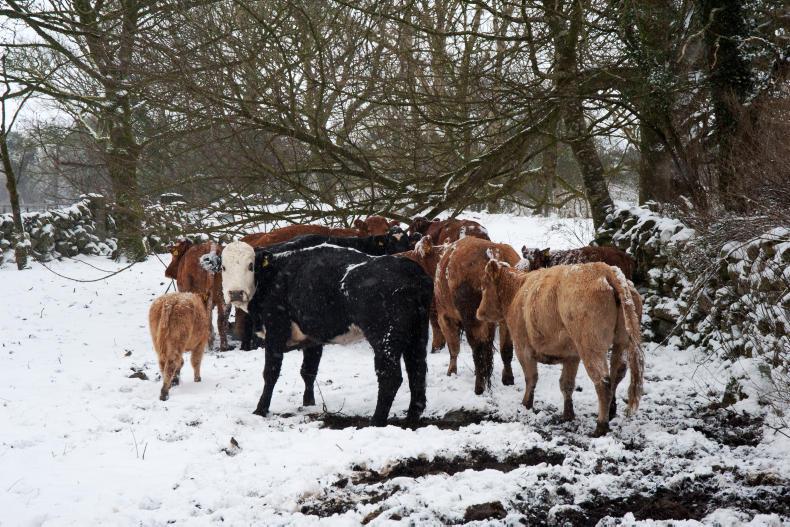Between shed damage, animal losses, animal health issues and the damage to the contents of sheds, the cost of Storm Emma is expected to run into tens of millions for farmers.
It is estimated that over 100 cattle and at least as many sheep have died as a result of Storm Emma, which hit the country last week.
Twenty-one weanlings died on one Wicklow farm on Friday last when big volumes of snow were blown into their shed, while in Wexford, four suckler cows were lost on the farm of John Fleming after the roof of a shed collapsed.
Speaking to the Irish Farmers Journal, several knackery operators said that they are very busy, with collections running three to four days behind. One knackery operator in Oldcastle, Co Meath, said he is “mental busy”.
“The lorries weren’t out there for a few days. I know of 10 to 12 weanlings and cows that smothered, others that slipped on ice and fell and broke their backs and pelvises. There’s some smothered ewes too.”
Another knackery operator in Meath said: “It’s hard to calculate the figures but we’re still catching up on the backlog. There’s an increase alright in cows and sheep. We collected about 70 in total on Monday, so we’re a lot busier than usual.”
Animal health issues
Drystock farmers are also facing animal health issues following the snow.
“Farmers with very open cattle sheds found that straw bedding became wet very quickly from snow,” said Teagasc drystock adviser Christy Watson, based in the Naas office.
“It’s been a particular problem where suckler cows are calving. If a farmer can’t get cows and calves outside then stock density rises. Then if beds aren’t dry, calves lose heat quickly. That can all trigger scours and pneumonia.”
Dairy farmers have been advised to keep an eye on cows after the disruption of last week, especially if silage is scarce or of poor quality.
“A lot of farmers had cows out, certainly by day, and they’ve had to come back in so that meant a sudden change to their diet,” said Wexford-based Teagasc dairy adviser Catherine Colfer.
“Where cows were back in and housed under difficult conditions, and under stress, that can lead to mastitis.”
Read more
Sheds buckle under the weight of snow
Contractors clear roads nationwide
Extent of sheep losses still unknown
'Small amount' of milk dumped on snowed-in farms
Collapsed shed and dumped milk on Co Wexford farm
Between shed damage, animal losses, animal health issues and the damage to the contents of sheds, the cost of Storm Emma is expected to run into tens of millions for farmers.
It is estimated that over 100 cattle and at least as many sheep have died as a result of Storm Emma, which hit the country last week.
Twenty-one weanlings died on one Wicklow farm on Friday last when big volumes of snow were blown into their shed, while in Wexford, four suckler cows were lost on the farm of John Fleming after the roof of a shed collapsed.
Speaking to the Irish Farmers Journal, several knackery operators said that they are very busy, with collections running three to four days behind. One knackery operator in Oldcastle, Co Meath, said he is “mental busy”.
“The lorries weren’t out there for a few days. I know of 10 to 12 weanlings and cows that smothered, others that slipped on ice and fell and broke their backs and pelvises. There’s some smothered ewes too.”
Another knackery operator in Meath said: “It’s hard to calculate the figures but we’re still catching up on the backlog. There’s an increase alright in cows and sheep. We collected about 70 in total on Monday, so we’re a lot busier than usual.”
Animal health issues
Drystock farmers are also facing animal health issues following the snow.
“Farmers with very open cattle sheds found that straw bedding became wet very quickly from snow,” said Teagasc drystock adviser Christy Watson, based in the Naas office.
“It’s been a particular problem where suckler cows are calving. If a farmer can’t get cows and calves outside then stock density rises. Then if beds aren’t dry, calves lose heat quickly. That can all trigger scours and pneumonia.”
Dairy farmers have been advised to keep an eye on cows after the disruption of last week, especially if silage is scarce or of poor quality.
“A lot of farmers had cows out, certainly by day, and they’ve had to come back in so that meant a sudden change to their diet,” said Wexford-based Teagasc dairy adviser Catherine Colfer.
“Where cows were back in and housed under difficult conditions, and under stress, that can lead to mastitis.”
Read more
Sheds buckle under the weight of snow
Contractors clear roads nationwide
Extent of sheep losses still unknown
'Small amount' of milk dumped on snowed-in farms
Collapsed shed and dumped milk on Co Wexford farm






 This is a subscriber-only article
This is a subscriber-only article











SHARING OPTIONS: